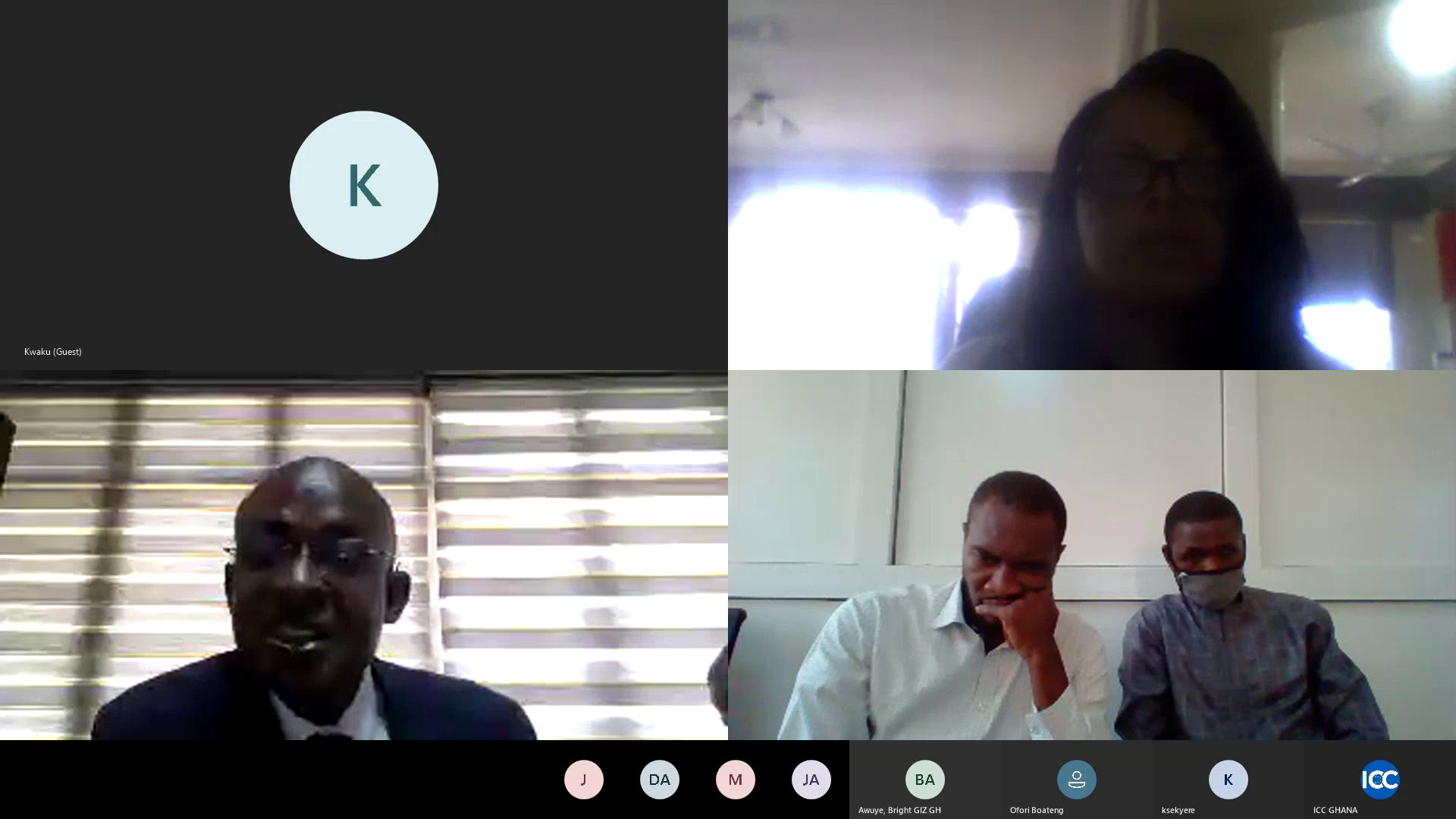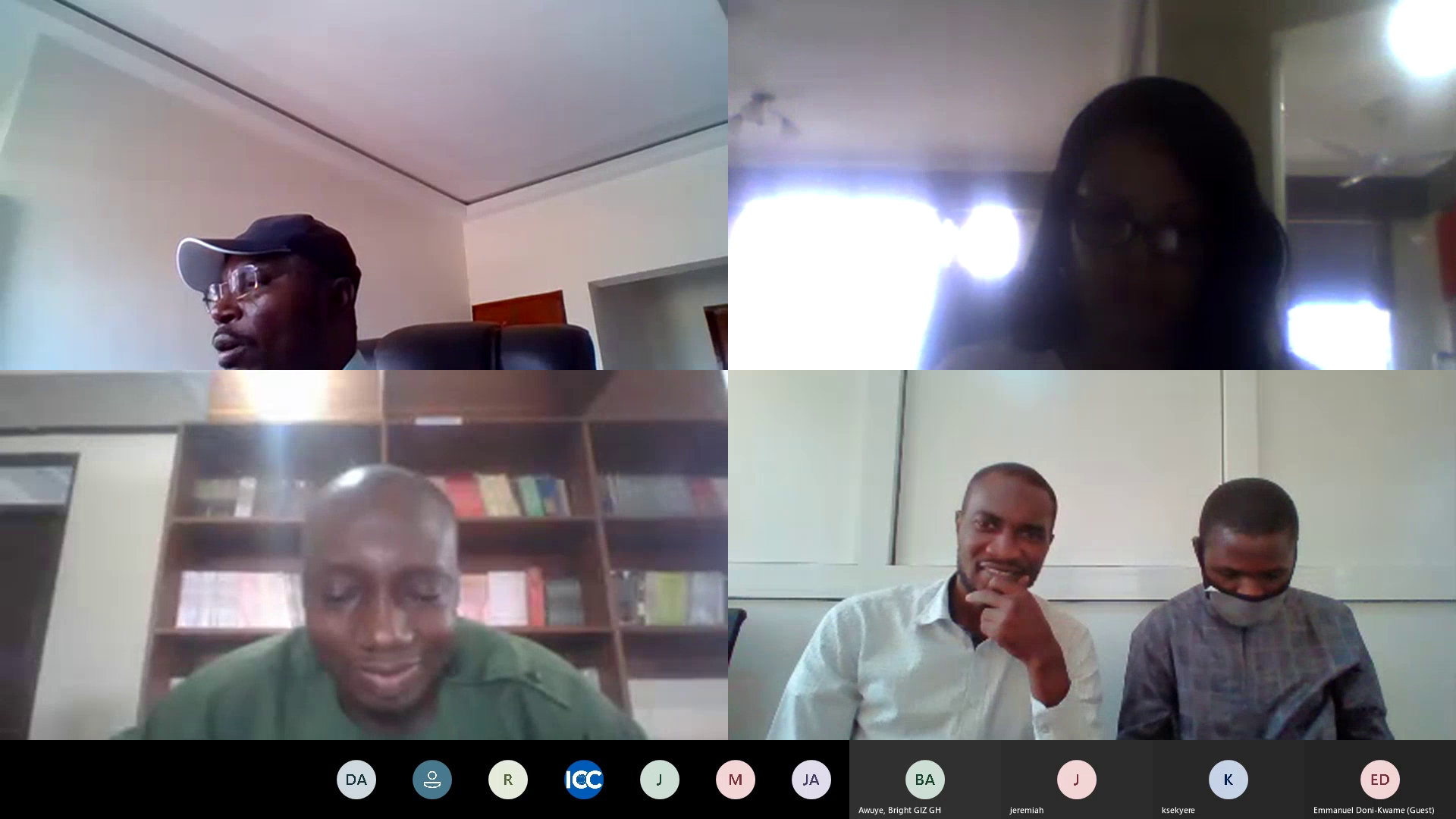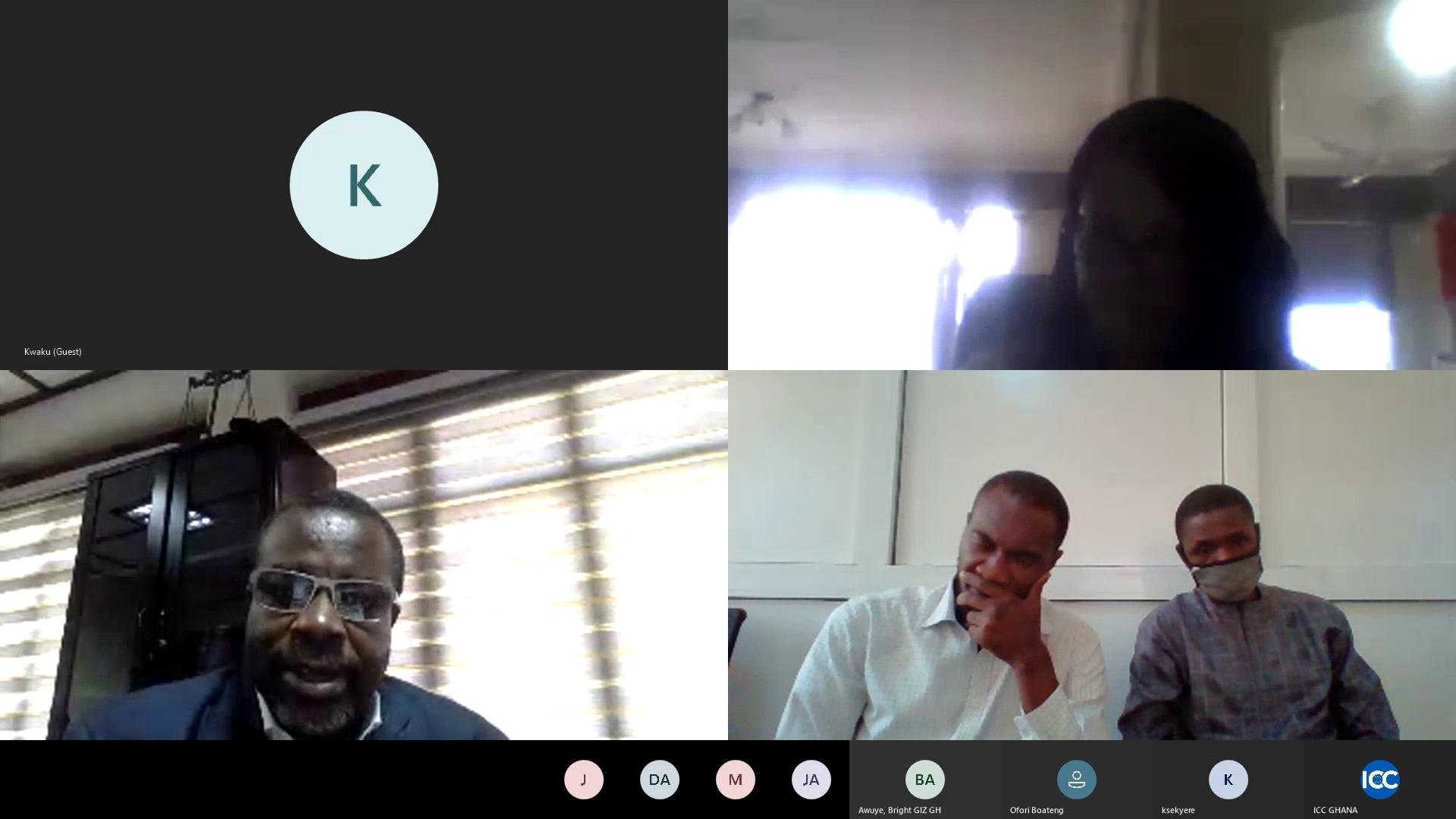Climate action should be everyone’s business – ICC Ghana
Climate variability and change constitute a major threat to national development and the growth of small and medium-scale enterprises in particular.
Humans are able to thrive in a wide range of climate conditions, but we also know that climatic factors, and climate extremes, can have a strong bearing on economic performance. Understanding and managing the link between climate and the economy is, therefore, an important facet of economic development.
CLICK HERE TO WATCH THE FULL WEBINAR
As the most recent scientific research shows, urgent measures are required to reach the objectives set in the Paris Agreement— namely, keeping the increase in global average temperatures to well below 2°C.

• For instance, by 2100, global sea level rise would be 10 cm lower with global warming of 1.5°C compared with 2°C. The likelihood of an Arctic Ocean free of sea ice in summer would be once per century with global warming of 1.5°C, compared with at least once per decade with 2°C. Coral reefs would decline by 70-90 percent with global warming of 1.5°C, whereas virtually all (> 99 percent) would be lost with 2°C.
• Every extra bit of warming matters, especially since warming of 1.5°C or higher increases the risk associated with long-lasting or irreversible changes, such as the loss of some ecosystems,
• Limiting global warming would also give people and ecosystems more room to adapt and remain below relevant risk thresholds. The good news is that some of the kinds of actions that would be needed to limit global warming to 1.5°C are already underway around the world, but they would need to be accelerated
The effect of climate change is being experienced by all facets of life and in all the major sectors of the Ghanaian economy. Disasters such as floods, rainstorms and strong winds are becoming more frequent than before. Many places have seen changes in rainfall, resulting in more floods, droughts, or intense rain, as well as more frequent and severe heat waves.
Addressing climate change issues in Ghana has gained traction in the agricultural sector. However, businesses and industry have also been noted to be significantly affected by climate change.
At ICC’s Centenary Summit in May, the International Chamber of Commerce (ICC) issued a Declaration setting out a vision to shape the future of global business for the next century. The Declaration includes an endorsement of the IPCC Special Report on Global Warming of 1.5°C and commits International Chamber of Commerce (ICC) to work towards mobilising business behind the 1.5°C target and net-zero emissions by 2050.
In line with this commitment, ICC is undertaking a number of efforts to help bolster climate action by business. One such action is the Chambers Climate Coalition pledge which was launched at the 11th World Chambers Congress in Rio de Janeiro By signing the pledge, chamber leaders around the world commit to take bold climate action.
That is why the International Chamber of Commerce (ICC)—in its capacity as the UNFCCC Focal Point for business and industry—is calling on all governments to do their part to ensure that we meet the goals of the Paris Agreement. An important step in this regard was delivering the Paris Rulebook at COP24.

The Paris Rulebook —an implementing framework where Parties show how they plan on reaching the Paris Agreement targets— While more companies are committing to leadership on climate action than at any other time in history, implementing the Paris Agreement would provide greater certainty on long-term climate policies and required investments, thus allowing businesses to increase their investments in innovation, research, infrastructure, and new technologies and solutions that will be essential to achieving the emission targets and ambitions of the Paris Agreement
Adaptation, resilience and capacity building: Business sees the urgency of responding to the impacts of climate change that are already being felt and preparing for the future effects of climate change. Business is responding by developing technologies, products and services to adapt to the effects of climate change and by building resilience into business operations, supply chains, policies and risk management strategies. Business can be a key partner for adaptation and resilience planning, including for knowledge-sharing; modelling; research; technology development and transfer; finance; insurance; capacity building and public-private partnerships.
Global Stocktake: The Global Stocktake must enable a full review of the progress of the Paris Agreement. The Global Stocktake should be carried out by an external body that will develop a technical assessment of progress based on cited references. This should then be reviewed by all Parties to the Paris Agreement, leading to the development of a summary for policymakers, which will help to inform future Nationally Determined Contributions (NDCs), which each Party is required to prepare, communicate and maintain under Article 4.2. Input from non-Party stakeholders must be encouraged as part of the primary technical assessment process.
Mitigation (Decision 1/ CP.21): Business strongly supports the development of guidance on the features of NDCs. It is essential that NDCs are clear, transparent and understandable to enable the private sector to evaluate and manage their current and future investments. Business can contribute in this regard and help in the elaboration, assessment, improvement and implementation of NDCs. Common timeframes for NDCs should be strongly considered to assist planning, promote greater ambition and enhance the Global Stocktakes.
Transparency: The objective of the Transparency Framework must be regular, clear and comprehensive reporting and accounting linked with technical expert review. Some flexibility will be necessary for certain developing countries. It is essential that the Transparency Framework enables the tracking of progress on NDCs. Overlaps between the UNFCCC’s existing measurement, reporting and verification (MRV) system must be minimised to prevent “double-reporting” being required.
Response Measures— Just transition and decent jobs: The Paris Agreement takes into account the imperative of a just transition of the workforce and the creation of decent work and quality jobs in accordance with nationally-defined development priorities. In fulfilling these responsibilities, the optimum outcome will be achieved by effective engagement with business to ensure that policy decisions are tailored to country-specific, sector-specific circumstances, including the skills and re-skilling needed for a green economy. There is no single policy template that can be applied in all circumstances. Just transition and decent jobs should be recognised in the NDCs.
Technology Mechanism Assessment: The current UNFCCC technology instruments for adaptation and mitigation of climate change should be expanded and developed further to achieve closer linkage of NDCs and technology needs assessments, develop more practical technology action plans and engage national designated entities more strongly on a global level.
Climate Finance (Article 9): The mitigation and adaptation strategies necessary to transition to a low-carbon economy and manage the impacts of climate change will require access to finance beyond ‘business as usual’. The private sector is a key partner in the development of the cooperative model proposed in Article 9 of the Paris Agreement. It will be necessary to design mechanisms to de-risk flows of private capital into climate change adaptation and mitigation investment opportunities, particularly in developing countries.
Market and non-market based approaches (Article 6): Business strongly supports the use of international market-based approaches and calls on Parties to complete guidance on Article 6 of the Paris Agreement through the Paris Rulebook. Business stands ready to inform the process of identifying the best ways forward to build-up a framework for Article 6. ICC’s recommendations are outlined in “Business Views on Market Mechanisms—Articles 6(1) to 6(7) of the Paris Agreement” and include:
• Building a framework for MRV of emissions that takes into consideration generally accepted existing international and national MRV frameworks1 and that is linked to the transparency framework being developed under Article 13 of the Paris Agreement.
• Creating ambition and predictability by developing comparable and measurable standards for emission reduction for NDC reviews so as to allow evaluation of mitigation actions, raise ambition and understand and avoid impacts such as carbon leakage.
• Consulting with experts of specific economic activities to establish further global emission reduction approaches on a sectoral basis.
• The rules must be clear and flexible to incentivise business participation while protecting environmental integrity and avoiding double-counting/ claiming.
• Transaction costs must be minimised to encourage the involvement of small and medium-sized enterprises.
• It is essential that Article 6 takes into account learnings from the Clean Development Mechanism and Joint Implementation.
As we prepare for key milestone events, including the United Nations Secretary-General’s Climate Action Summit which will take place in New York this September, and COP25, which will take place in Santiago, Chile this December, ICC has been calling for greater climate ambition from both business and government – Climate action is everyone’s business.
Indeed, Ghana’s Nationally Determined Contribution (NDC) under the Paris Agreement on Climate Change indicates that the long-term goal of Ghana’s adaptation is to increase climate resilience and decrease vulnerability for enhanced sustainable development. One key policy area of the National Climate Change Policy of Ghana is disaster preparedness and response as a result of the need to ensure resilience for all facets of the sectors of the economy.
Climate change has the potential to cost small business owners millions in damages, yet there is little knowledge on how small businesses are coping with the impacts of climate change. Micro, small and medium enterprises (MSMEs) are particularly vulnerable because of their more limited capacities to absorb disaster losses.
ICC Ghana with the support of the BUSAC Fund is undertaking an advocacy action to create awareness of Climate Change and coping strategies for SME’s.
The purpose of the advocacy action is to create greater awareness of the menace of climate change and make this top of mind among the general public, Identify adaptation measures and disaster preparedness activities by businesses to address climate risks, evaluate the effectiveness of government programmes that assisted in post-disaster and encourage government to provide the necessary framework for capacity building and awareness raising for businesses to incorporate mitigation and adaptation measures and develop the necessary climate strategies.
As part of the activities of the action, ICC Ghana organised a stakeholder worksop
In Accra to dialogue on measures and disaster preparedness activities by businesses to address climate risk.
Participants were taken through strategies for concessional financial resources for climate change by the chief climate finance officer and Coordinator of the Green Climate Fund at the African Development Bank, Dr Timothy Afful-Koomson.
Indeed ICC Ghana recognises that mitigation and adaptation actions require the collective effort of government, the private sector and society.
Some popular recommendation include each citizen to plant a tree and a ban on single use plastic e.g. sachet water & plastic bag for packaging and shopping
The objectives of the advocacy action include:
1. Identify adaptation measures and disaster preparedness activities by businesses to address climate risks.
2. Evaluate the effectiveness of government programmes that assisted in post-disaster.
3. Encourage government to provide the necessary framework for capacity building and awareness raising for businesses to incorporate mitigation and adaptation measures and develop the necessary climate strategies.
SMEs typically lack adequate resources to access information needed to guide their decision-making under new climate conditions, but targeted weather and climate information can help them understand particular business risks and opportunities. For example, businesses in rural communities can benefit greatly from early warning systems
SMEs have the opportunity to provide products and services to meet consumer demand in a changing climate. Finding and producing products and services that help consumers build resilience, plus finding ways to better access new markets in general, can greatly help SMEs become more resilient and prosperous.
More companies than ever before are taking transformative climate action and the reason is simple: climate change is everyone’s business. A failure to mitigate the impacts of climate change would wreak catastrophic damage on things we all share —our common planet and the prospects for future generations.

Coping Strategies for SMEs In Dealing with Climate Change
The private sector’s role in Ghana can help communities become resilient to climate change. In Ghana, the private sector generates more than 60 percent of gross domestic product, and micro and small enterprises (MSEs) in Ghana provide more than 60 percent of all jobs. Many of these jobs are in the agriculture sector, which is especially vulnerable to extreme weather changes. Moreover, since billions of people rely on SMEs for their livelihoods, supporting this economic segment is crucial to help communities adapt to climate change.
For SMEs to deal with the adverse effect of climate change the following coping and adaption mechanisms are recommended:
• Business-relevant climate information and risk analysis
SMEs typically lack adequate resources to access information needed to guide their decision-making under new climate conditions, but targeted weather and climate information can help them understand particular business risks and opportunities. For example, businesses in rural communities can benefit greatly from early warning systems, such as floods, droughts, tidal waves etc.
• Technical assistance and training
The public sector can help SMEs through sharing information, conducting research and development, and building skills to understand adaptation options that help their businesses become more resilient.
• Government policies enabling adaptation investments
Governments can integrate adaptation into their development planning across agencies to conserve resources, improve productivity, and strengthen community resilience, with far-ranging impacts for the SMEs or example as done in the Nationally Determined Contributions of Ghana.
• Market and business development
SMEs have the opportunity to provide products and services to meet consumer demand in a changing climate. Finding and producing products and services that help consumers build resilience, plus finding ways to better access new markets in general, can greatly help SMEs become more resilient and prosperous.
• Partnerships and cooperatives
Partnering with other businesses or public entities is a cost-effective way for SMEs to overcome having limited resources to invest in adaptation. This can enable them to pool resources and funding and to self-insure against weather-related shocks.
• The use of insurance in the event of mitigate losses
Another mechanism that SMEs can employ to mitigate the impact of climate change on their business is the use of insurance.
The private sector has enormous positive potential for climate action yet needs greater certainty on long-term climate policies and required investments.
Business has uniquely relevant insights, technical expertise and case studies that will be critical to ensuring the effectiveness of national determined contributions (NDCs).
ICC urges Parties to include business in developing climate change policies at the international and national level.
ICC also encourages government to accelerate and encourage private sector innovation through appropriate fiscal policies and de-risking flows of private capital into climate change adaptation and mitigation investment opportunities
Design transformative climate policies that work for everyone, every day, everywhere
Urgent and transformative policies are needed to reach the goals set out in the Paris Agreement. Such changes will have dramatic implications for workers around the world and their communities.
Business is a key agent in setting a sustainable path for communities, workers and the climate that leaves no one behind.



